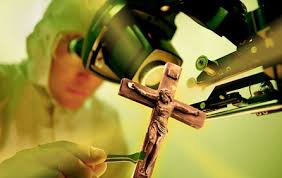
In Sunday’s account of Jesus’ transfiguration (Mk 9:2-10), his disciples witness long-dead prophets conversing with their soon-to-be-dead master. After this vision, the Master instructs them not to tell anyone about this until he rises from the dead. The reading ends with these disciples discussing what rising from the dead means.
Ever since that rising, faith has taught Christians that life is about rising above death—and being born to eternal life. For scientists, however, life isn’t about faith, but the knowledge that comes from studying the transfiguration of life over time. They are born again in the ways of science, according to physicist Frank Wilczek. In his new book, “Fundamentals: Ten Keys to Reality,” Wilczek (who was raised Catholic) writes:
“In studying how the world works we are studying how God works, and thereby learning what God is. In that spirit we can interpret the search for knowledge as a form of worship, and our discoveries as revelations.”
Wilczek evolved from a civilian theist to a scientific pantheist to whom our matter-based universe is divine. He notes that while the human lifetime is dwarfed by the age of the cosmos, our lifespan is long enough for our brain to process about 100 billion distinct moments of consciousness.
With all their knowledge, however, scientists still fear arriving at their last moment of consciousness—and facing their own mortality. They’d have to acknowledge their fear is just one in a package of human sufferings, accompanied by pride, greed, anger, envy, doubt, hatred, jealousy and other sins that faith tells us are deadly. If woke scientists who traded faith for knowledge had kept the faith, maybe they’d realize those billions of moments of consciousness are God’s design for helping us channel his grace to alleviate the suffering caused by our deadly sins.
There’s one key element you won’t find listed among the handful of subatomic elements Wilczek and his colleagues say we have in common with the natural god they worship: love. That is the driving force of divine consciousness, and its purest form is evidenced by the ability to lay down one’s life for one’s friends. This phenomenon of rising above death connects us with the same God who not only gave Abraham the courage to sacrifice his only son for Him (Gn 22:1-2, 9a, 10-13, 15-18), but modeled for us that same courage in sacrificing His only son for us.
So what is death? For us carbon-and-faith-based units, it’s the kind of transfiguration Jesus modeled for us from crucifixion to resurrection. The more important question those fearful scientists should look into is, what is faith? They should start that inquiry with the epiphany that helped St. Paul find his faith (taken from Sunday’s second reading, Rom 8:31b-34):
If God is for us, who can be against us? He who did not spare his own Son but handed him over for us all, how will he not also give us everything else along with him?
That “Everything Else” is immeasurable by science but easily contained in our undying faith.
–Tom Andel